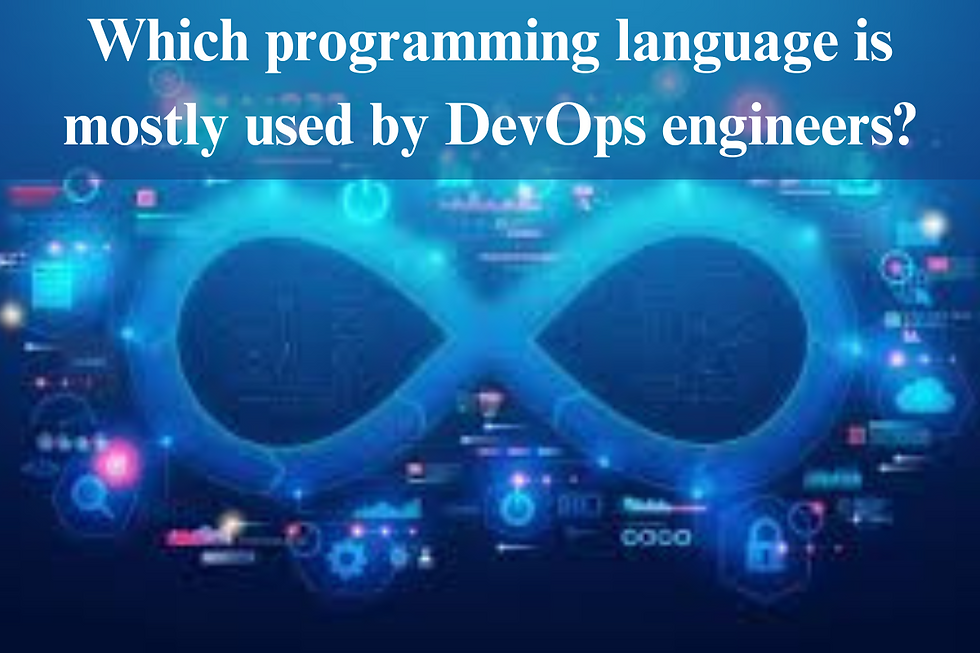How to choose the best Devops training program for you
- kanika chauhan

- Aug 1, 2024
- 3 min read

In the rapidly evolving world of technology, DevOps has emerged as a critical practice for enhancing collaboration between development and operations teams. This approach not only accelerates software delivery but also ensures higher quality and reliability. As demand for DevOps professionals rises, so does the availability of training programs designed to equip individuals with the necessary skills. However, choosing the best DevOps training program can be challenging.
1. Identify Your Goals and Objectives
Before diving into the myriad of available programs, it’s crucial to identify your goals and objectives. Are you a beginner looking to break into the field, or are you an experienced professional aiming to upgrade your skills? Your current level of expertise will significantly influence the type of training you need. Define what you want to achieve with the training, such as mastering specific tools, gaining a comprehensive understanding of DevOps practices, or preparing for certification exams.
2. Evaluate the Curriculum
The curriculum is the heart of any training program. A well-rounded DevOps training program should cover essential topics such as:
Continuous Integration and Continuous Deployment (CI/CD)
Infrastructure as Code (IaC)
Containerization and Orchestration (e.g., Docker, Kubernetes)
Monitoring and Logging
Cloud Platforms (e.g., AWS, Azure, Google Cloud)
Configuration Management (e.g., Ansible, Chef, Puppet)
Security and Compliance
Make sure the course covers both academic concepts and real-world, practical experience. Practical exercises, labs, and real-world projects are vital for understanding how to apply DevOps principles effectively.
3. Instructor Expertise
A training program's effectiveness is determined on the quality of its instruction. Look into the instructors' backgrounds to ensure they have real-world experience and a thorough understanding of DevOps principles. Instructors who actively work in the field can provide valuable insights and practical knowledge that goes beyond textbook learning.
4. Certification Preparation
Certifications can help you improve your resume and validate your talents for future employers. If certification is one of your objectives, select a training program that prepares you for renowned DevOps certifications such as:
AWS Certified DevOps Engineer
Microsoft Certified: DevOps Engineer Expert
Google Professional DevOps Engineer
Certified Kubernetes Administrator (CKA)
Docker Certified Associate (DCA)
Programs designed with certification preparation in mind often provide practice exams, study guides, and other resources to help you succeed.
5. Flexibility and Format
When selecting a training program, take your schedule and learning preferences into account. DevOps training is available in various formats, including:
Online Courses: Ideal for those who need flexibility and prefer self-paced learning.
In-Person Bootcamps: Intensive, immersive experiences that can provide a deep dive into DevOps practices.
Hybrid Programs: Combine online learning with in-person sessions or live virtual classes.
Evaluate the time commitment required for each format and choose one that fits your lifestyle and learning preferences.
6. Community and Support
A strong community and support system can enhance your learning experience. Look for programs that offer access to forums, study groups, and networking opportunities with fellow students and instructors. Additionally, consider the availability of support resources such as mentoring, tutoring, and career services.
7. Reputation and Reviews
Research the reputation of the training program and the provider. Look for reviews and testimonials from past students to gauge the effectiveness and quality of the training. Reputable providers often have a track record of successful graduates and positive feedback.
8. Cost and Value
While cost should not be the sole determining factor, it’s essential to consider your budget. Some programs may be more expensive but provide extensive resources, support, and job placement assistance, which can justify the higher price.
9. Hands-On Labs and Real-World Projects
Practical experience is crucial in DevOps. Ensure the training program includes hands-on labs and real-world projects that allow you to apply what you’ve learned in a controlled environment. This practical experience will be invaluable when transitioning to real-world scenarios.
10. Job Placement Assistance
Some training programs offer job placement assistance, including resume building, interview preparation, and connections with potential employers. If transitioning to a new job or advancing your career is a primary goal, consider programs that provide these additional services.
Conclusion
Choosing the best DevOps training program requires careful consideration of your goals, the curriculum, instructor expertise, certification preparation, flexibility, community support, reputation, cost, and practical experience opportunities. By evaluating these factors, you can find a program that not only meets your needs but also sets you on a path to success in the dynamic field of DevOps. Investing in the right training program can enhance your skills, boost your career prospects, and position you as a valuable asset in any organization.
Whether you’re just starting your DevOps journey or looking to deepen your expertise, taking the time to choose the right training program will pay off in the long run, equipping you with the knowledge and skills needed to excel in this fast-paced, ever-evolving field. For those located in or near Noida, exploring DevOps Training in Noida, Delhi, Greater Noida, Gurgaon, Faridabad, Mumbai and other cities in India can provide local opportunities to gain these valuable skills and advance your career.



Comments